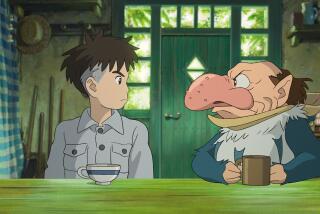Review: Welcome to a land of enchantment in ‘Over the Garden Wall’
The first thing to say about Patrick McHale’s Cartoon Network miniseries “Over the Garden Wall,” after noting that it is beautiful to behold and worth the while of anyone interested in contemporary animation, is that it has been made in a two-dimensional, hand-drawn, hand-painted style virtually extinct in American cartoon features.
It comes in 10 parts, airing two by two Monday through Friday. Each segment lasts 11 minutes, the length of a typical cartoon short; together, they make a 110-minute self-contained movie.
I don’t mean to suggest that some fine films haven’t been rendered in 3-D — or that some terrible ones haven’t been drawn by hand. But there is a rough sameness to CGI cartoons; they are limited by their roundedness, their fine-textured apparent “actuality.” Their two-dimensional counterparts — still common in television, for now — are by contrast rooted in millenniums of image-making, modes of representation, graphic symbolism, systems of spatial illusion or spatial compression, from cave paintings to comix.
And so from the start, something feels a little radical about “Over the Garden Wall,” which is consciously old-fashioned both in form and substance. Set in “a mysterious place called the Unknown where long-forgotten stories are revealed to those who travel through the wood,” it has a kind of artisanal quality, reflected not only in its making — you can see the paper texture in art director Nick Cross’ lovely background paintings — but also in its milieu in largely late 19th and early 20th-century Americana, with elements of the Brothers Grimm and the Brothers Fleischer (Max and Dave) also worked in.
Two brothers, teenager Wirt (played by Elijah Wood, an adult) and much younger Greg (Collin Dean, a child), earlier seen in McHale’s short-film-cum-pilot “Tome of the Unknown,” find themselves lost in unfamiliar woods. Wirt wears a conical hat and cape that seem more suggestive of the Black Forest than the American landscape they’re wandering through; Gregory wears an inverted teapot for a hat and carries a frog. Wirt is a worrier — a worry Wirt — paralyzed by thought; Greg, who barely thinks at all, is all action.
They meet a talking bluebird named Beatrice (Melanie Lynskey), who is both helpful and impatient. (“Bluebirds have a short life span — you two are literally killing me every moment I’m forced to spend with you.”) Together they move from station to enchanted station, from scrape to scrape, misfit to monster, on what will hopefully be the way home.
“The Wizard of Oz” is its most obvious antecedent — the L. Frank Baum book, primarily, though there are references to the MGM musical as well. There are echoes too of “The Divine Comedy” and “The Magic Flute,” of Joel Chandler Harris’ fables and Carl Sandburg’s “Rootabaga Stories.” It is a heavily packed suitcase.
It’s a musical too. The action is interrupted or moved along by songs in a parlor or early jazz vernacular, with music by the L.A.-based Petrojvic Blasting Company. Singers were drawn from the local old-time music scene (Frank Fairfield, Janet Klein, Jerron “Blind Boy” Paxton), along with opera singers Samuel Ramey and Deborah Voigt, and venerable crooner Jack Jones, who performs the series’ theme. Nonsinging voices include John Cleese, Christopher Lloyd and Chris Isaak.
It’s no easy thing to create a credible, original other world. “Adventure Time,” which McHale helped develop, has managed it by the steady accretion of detail, a tendency to show rather than explain and a dedication to the principle of “weird thought, best thought.” Its Land of Ooo seems less invented than discovered.
There are times early on when “Over the Wall” does feel a little worked or precious, a little too intent on its own folksiness, like that guy with the waxed mustache who served you coffee this morning. But it becomes more satisfying as it goes on — I have seen eight of the 10 episodes — and various misdirections and motivations are revealed. The episodes knit into a narrative, and the miniseries’ sassy modern side mitigates its fairy-tale wistfulness.
“You don’t need directions, pilgrim,” someone tells Wirt. “You follow that compass inside your heart.”
“No,” Wirt replies. “I think we need directions.”
More to Read
The complete guide to home viewing
Get Screen Gab for everything about the TV shows and streaming movies everyone’s talking about.
You may occasionally receive promotional content from the Los Angeles Times.







